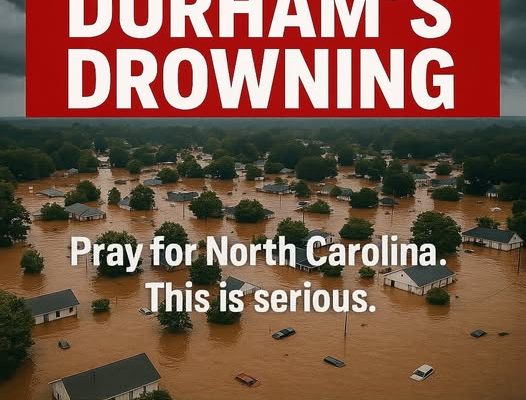Downtown Durham is facing an unprecedented catastrophe as relentless, torrential rain has turned streets into powerful rivers and entire neighborhoods into underwater wastelands. Once-familiar roads have vanished beneath swirling, debris-filled currents. Homes that once stood proudly are now submerged up to their rooftops, leaving residents with no choice but to climb to higher ground or seek refuge on rooftops, waving frantically for help.
Videos flooding social media show heart-wrenching scenes: parents clutching terrified children, elderly residents huddled on second-story balconies, and pets trapped on floating debris. Cars are being swept away like toys, colliding with streetlights and storefronts before vanishing beneath the churning water. Many residents are using anything they can find—kayaks, inflatable pool rafts, even doors pried off hinges—to try and escape or reach stranded neighbors.
Emergency services are stretched far beyond capacity. First responders, working around the clock, are unable to access many parts of the city due to impassable, fast-moving floodwaters. Helicopters circle overhead, attempting to drop supplies and rescue stranded individuals, but heavy rain and low visibility make even these efforts perilous. Authorities have urged residents to stay where they are if they are in a safe location, to conserve food, water, and battery power, and to avoid wading into floodwaters, which may hide live electrical wires, sharp objects, or deep sinkholes.
Power outages are cascading across Durham, plunging entire neighborhoods into darkness. Without electricity, communication is faltering, and residents are relying on cell phone flashlights and candles to see at night. Hospitals and shelters are operating on backup generators, struggling to care for an influx of injured and displaced people. Essential supplies—food, clean water, blankets, and medical kits—are running dangerously low.
Despite the massive scale of destruction and the clear urgency of the crisis, national media coverage remains limited. Local residents and grassroots journalists are questioning why their plight is not being widely broadcast, calling out the silence from major networks and federal agencies. Online, the question echoes again and again: “Where is FEMA?” The apparent lack of immediate federal aid has fueled widespread frustration and fear, with many feeling abandoned in their darkest hour.
Footage taken by residents reveals storm drains violently gushing, unable to keep up with the volume of rain. Entire intersections are now lakes, with traffic lights swaying above the water line. At night, the dangers multiply—the pitch-black floodwaters hide jagged debris, open manholes, and unstable structures. Some residents have been seen using ropes tied to chimneys or street signs to navigate across rooftops in total darkness.
Community groups are stepping up heroically, forming human chains to rescue trapped neighbors and organizing makeshift supply drops for families stranded inside their homes. Volunteers are risking their own lives to bring bottled water, food, and blankets to those cut off from all assistance.
This flood is not a typical seasonal event—it is a life-threatening, historic disaster unfolding in real time. Entire blocks have disappeared, livelihoods are washed away, and families are left clinging to hope as they await help that feels painfully slow to arrive.
The resilience of Durham’s residents shines through even in these harrowing conditions. Acts of compassion and bravery—neighbors checking on each other, strangers pulling each other to safety—offer glimpses of humanity’s strength amid chaos. But the overwhelming reality is that they cannot fight this battle alone.
As rain continues to fall and floodwaters rise, the people of Durham are left facing each new hour with dwindling resources, mounting fear, and an urgent plea for help. Their message to the world is clear: this is not just another storm. It is a desperate fight for survival, and they need immediate, comprehensive aid before more lives are lost to the rising water and relentless storm.



